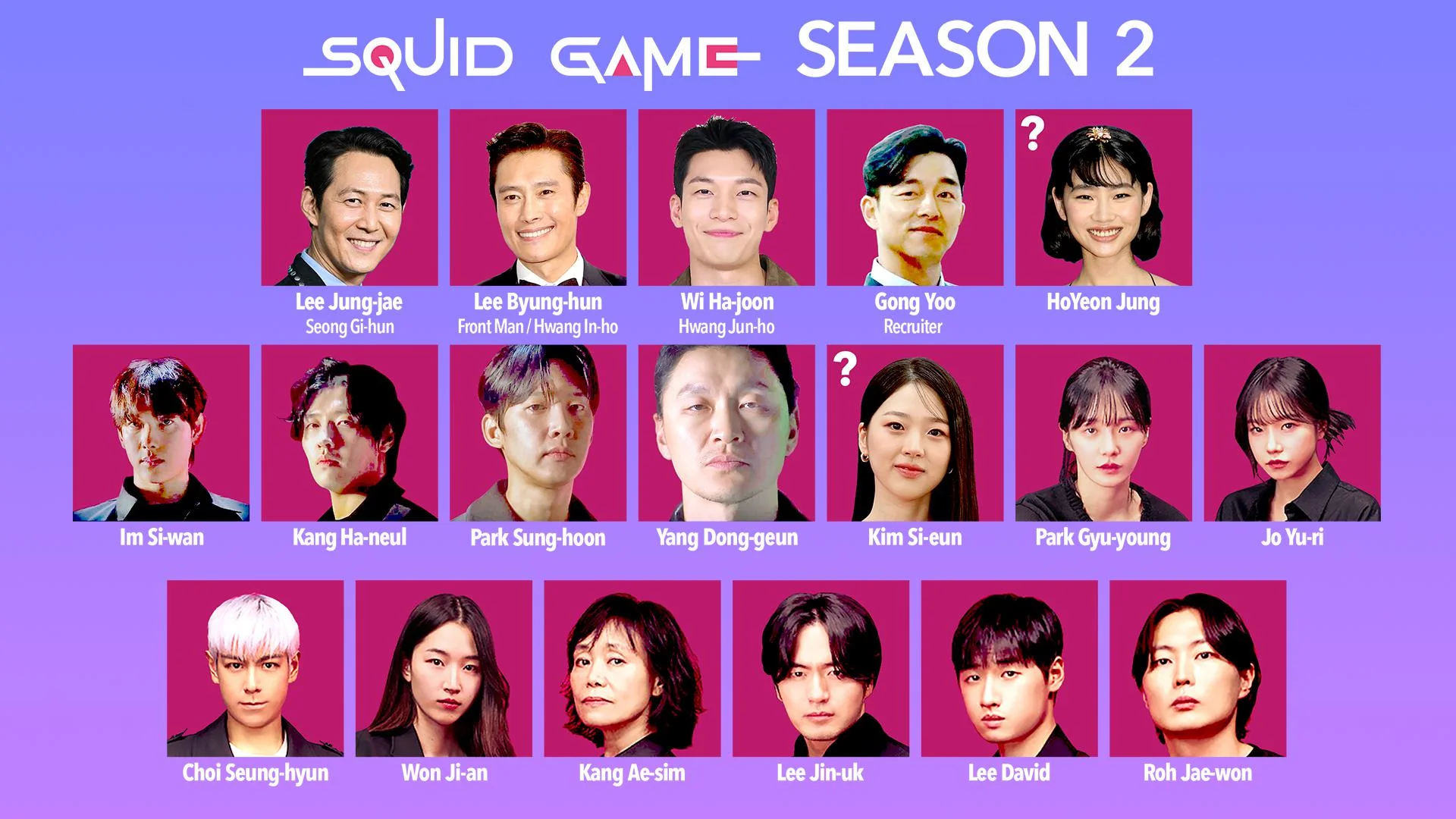
Here is a complete download list of Squid Game Season 2 subtitles:
Subtitle accuracy: 100%
1. Download Squid Game Season 2 subtitles: Episode 1
Click here to download Squid Game Season 2 episode 1 subtitles
2. Download Squid Game Season 2 subtitles: Episode 2
Click here to download Squid Game Season 2 episode 2 subtitles
3. Download Squid Game Season 2 subtitles: Episode 3
Click here to download Squid Game Season 2 episode 3 subtitles
4. Download Squid Game Season 2 subtitles: Episode 4
Click here to download Squid Game Season 2 episode 4 subtitles
5. Download Squid Game Season 2 subtitles: Episode 5
Click here to download Squid Game Season 2 episode 5 subtitles
6 Download Squid Game Season 2 subtitles: Episode 6
Click here to download Squid Game Season 2 episode 6 subtitles
7. Download Squid Game Season 2 subtitles: Episode 7
Click here to download Squid Game Season 2 episode 7 subtitles
About Squid Game Season 2

Squid Game (Korean: 오징어 게임), created by Hwang Dong-hyuk, is a South Korean survival drama series that gained international acclaim for its gripping narrative and social commentary.
The second season continues the harrowing story of contestants who risk their lives in deadly games for a chance at a life-changing prize.
Premiering on Netflix on December 26, 2024.
Squid Game Season 2 delves deeper into the backstories of returning characters and introduces new players, all while maintaining the high-stakes tension that captivated audiences in the first season.
The series explores themes of greed, desperation, and the human condition, set against the backdrop of children’s games turned lethal.
As the players navigate through increasingly dangerous challenges, alliances are formed and broken, leading to shocking twists and moral dilemmas.
The series has been praised for its production quality, storytelling, and performances, particularly that of Lee Jung-jae as Gi-hun and Lee Byung-hun as the enigmatic Front Man.
The second season promises to expand on the universe established in the first season, introducing new layers of complexity and intrigue as it explores the implications of wealth disparity and societal issues.
Squid Game has become a cultural phenomenon since its debut, sparking discussions about its themes and inspiring countless memes and parodies across social media platforms.
Premise (Plot)
In South Korea, Seong Gi-hun, a divorced father and indebted gambling addict who lives with his elderly mother, is invited to play a series of children’s games for a chance at a large cash prize.
Accepting the offer, he is taken to an unknown location where he finds himself among 455 other players who are all in deep financial trouble.
The players are made to wear green tracksuits and are kept under watch at all times by masked guards in pink jumpsuits, with the games overseen by the Front Man, who wears a black mask and black uniform.
The players soon discover that losing a game results in their deaths, with each death contributing ₩100 million (est. $68,000 in 2024) to the potential ₩45.6 billion (est. $31 million in 2024) grand prize.
Gi-hun allies with other players, including his childhood friend Cho Sang-woo and North Korean defector Kang Sae-byeok, to try to survive the games’ physical and psychological twists, while detective Hwang Jun-ho infiltrates the games as one of the guards to find his missing brother.
In the second season, Gi-hun, who had vowed revenge three years after winning the game, participates in it again to take revenge on the Front Man and end the game for good, and is joined by police officer Jun-ho, the Front Man’s brother.
After assuming full control of the game following Il-nam’s death, the Front Man attempts to make Gi-hun see that there is no way he can end the games due to the true nature of people.
Development
Around 2008, Hwang Dong-hyuk tried unsuccessfully to get investment for a different movie script that he had written, and he, his mother, and his grandmother had to take out loans to stay afloat, but still struggled amid the debt crisis within the country.
He spent his free time in a manhwabang (South Korean comic cafe) reading Japanese survival manga such as Battle Royale, Liar Game and Gambling Apocalypse: Kaiji.
Hwang compared the characters’ situation in these works to his own current situation and considered the idea of being able to join such a survival game to win money to get him out of debt, leading him to write a film script on that concept throughout 2009.
Hwang stated, “I wanted to write a story that was an allegory or fable about modern capitalist society, something that depicts an extreme competition, somewhat like the extreme competition of life. But I wanted it to use the kind of characters we’ve all met in real life.”
Hwang feared the storyline was “too difficult to understand and bizarre” at the time. Hwang tried to sell his story to various Korean production groups and actors, but had been told it was too grotesque and unrealistic.
Hwang put this script aside and over the next ten years successfully completed three other films, including the crime drama film Silenced (2011) and the historical drama film The Fortress (2017).
In the 2010s, Netflix had seen a large growth in viewership outside of North America, and started investing in productions in other regions, including Korea.
In 2018, Ted Sarandos, co-CEO of Netflix, stated that they were looking for more successes from overseas productions: “The exciting thing for me would be if the next Stranger Things came from outside America.
Right now, historically, nothing of that scale has ever come from anywhere but Hollywood.” Netflix had opened up a division in Asia in 2018, and while they were still operating out of temporary leased office space in Seoul, Hwang brought his script to their attention.
Kim Minyoung, one of Netflix’s content officers for the Asian regions, recognized Hwang’s talent from The Fortress and his other films, and upon seeing his script for Squid Game, knew they needed it for the service.
Kim said ” We were looking for shows that were different from what’s traditionally ‘made it,’ and Squid Game was exactly it”. In September 2019 Netflix formally announced that they would produce Hwang’s work as an original series.
Netflix’s Bela Bajaria, head of global television operations, said of their interest in Hwang’s work that “we knew it was going to be big in Korea because it had a well-regarded director with a bold vision”, and that “K-Dramas also travel well across Asia”.
Regarding his return to the project, Hwang commented, “It’s a sad story. But the reason why I returned to the project is because the world 10 years from then has transformed to a place where these unbelievable survival stories are so fitting, and I found that this is the time when people will call these stories intriguing and realistic.”
Hwang further believed that the COVID-19 pandemic impacted the economic disparity between classes in South Korea, and said that “All of these points made the story very realistic for people compared to a decade ago”.
With the Netflix order, the film concept was expanded out to a nine-episode series. Kim stated that there was “so much more than what was written in the 120-minute format. So we worked together to turn it into a series.”
Hwang said he was able to expand the script so that it “could focus on the relationships between people [and] the stories that each of the people had”.
Initially, Netflix had named the series Round Six, rather than Squid Game as Hwang had suggested; according to Netflix’s vice president for content in Asia Kim Minyoung, while they knew that the name “squid game” would be familiar to Korean viewers from the children’s game, it “wouldn’t resonate because not many people would get it”, and opted to use Round Six as it self-described the nature of the competition.
It has been titled as such in Brazil. As production continued, Hwang pushed on the service to use Squid Game instead; its cryptic name and unique visuals helped to draw in curious viewers, according to Kim.
At the time that Hwang wrote the series, his goal was to have the series reach the most-watched show in Netflix in the United States for at least one day.
Hwang had initially written the series as eight episodes, which was comparable to other Netflix shows, but found that the material for the last episode was longer than he planned, so it was split into two.








